Text
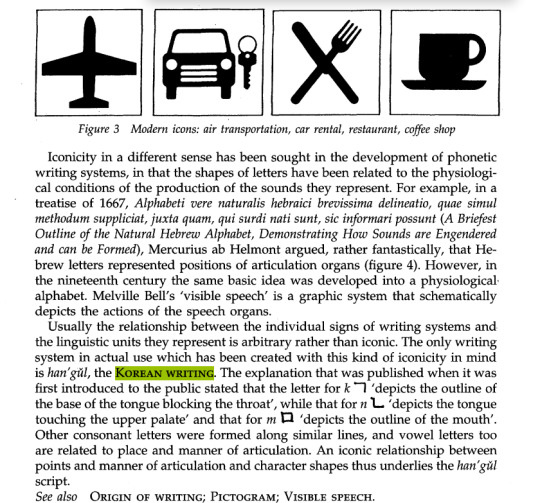
The Blackwell Encyclopedia of Writing Systems, Florian Coulmas
Figure 3. Modern icons: air transportation, car rental, restaurant, coffee shop
Iconicity in a different sense has been sought in the development of phonetic writing systems, in that the shapes of letters have been related to the physiological conditions of the production of the sounds they represent. For example, in a treatise of 1667, Alphabeti vere naturalis hebraici brevissima delineatio, quae simul methodum suppliciat, juxta quam, qui surdi nati sunt, sic informari possunt (A Briefest Outline of the Natural Hebrew Alphabet, Demonstrating How Sounds are Engendered and can be Formed), Mercurius ab Helmont argued, rather fantastically, that Hebrew letters represented positions of articulation organs (figure 4). However, in the nineteenth century the same basic idea was developed into a physiological
alphabet. Melville Bell's 'visible speech' is a graphic system that schematically depicts the actions of the speech organs. Usually the relationship between the individual signs of writing systems and the linguistic units they represent is arbitrary rather than iconic. The only writing system in actual use which has been created with this kind of iconicity in mind is han'geuI, the Korean writing. The explanation that was published when it was first introduced to the public stated that the letter for k 'depicts the outline of the base of the tongue blocking the throat', while that for n 'depicts the tongue touching the upper palate' and that for m 'depicts the outline of the mouth'. Other consonant letters were formed along similar lines, and vowel letters too are related to place and manner of articulation. An iconic relationship between points and manner of articulation and character shapes thus underlies the han'geul script.
See also ORIGIN OF WRITING; PICTOGRAM; VISIBLE SPEECH
4 notes
·
View notes
Text
The real hopeless victims of mental illness are to be found among those who appear to be most normal. Many of them are normal because they are so well adjusted to our mode of existence, because their human voice has been silenced so early in their lives that they do not even struggle or suffer or develop symptoms as the neurotic does. They are normal not in what may be called the absolute sense of the word; they are normal only in relation to a profoundly abnormal society. Their perfect adjustment to that abnormal society is a measure of their mental sickness. These millions of abnormally normal people, living without fuss in a society to which, if they were fully human beings, they ought not to be adjusted.
Aldous Huxley, Brave New World Revisited
479 notes
·
View notes
Text
“We can express our feelings regarding the world around us either by poetic or by descriptive means. I prefer to express myself metaphorically. Let me stress: metaphorically, not symbolically. A symbol contains within itself a definite meaning, certain intellectual formula, while metaphor is an image. An image possessing the same distinguishing features as the world it represents. An image — as opposed to a symbol — is indefinite in meaning. One cannot speak of the infinite world by applying tools that are definite and finite. We can analyse the formula that constitutes a symbol, while metaphor is a being-within-itself, it’s a monomial. It falls apart at any attempt of touching it.”
— Andrei Tarkovsky, Sculpting in Time (via ardora)
1K notes
·
View notes
Audio
Cliff Martinez - Bride of deluxe
Drive OST
44 notes
·
View notes
Photo






Aftersun (2022)
dir. Charlotte Wells
10K notes
·
View notes
Text

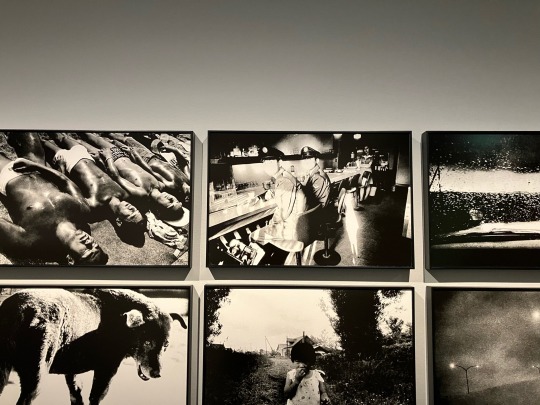
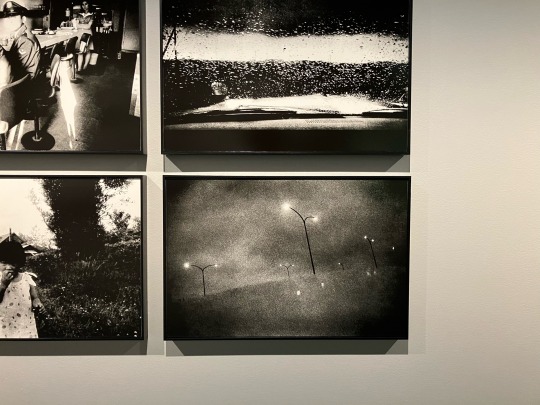
Daidō Moriyama Retrospective
"what we photographers can do, and should do, is capture with our own eyes those fragments of reality that are completely impossible to capture with existing words, and continue actively to create materials which confront those words and thoughts." — Provoke #2, editorial
4 notes
·
View notes
Text
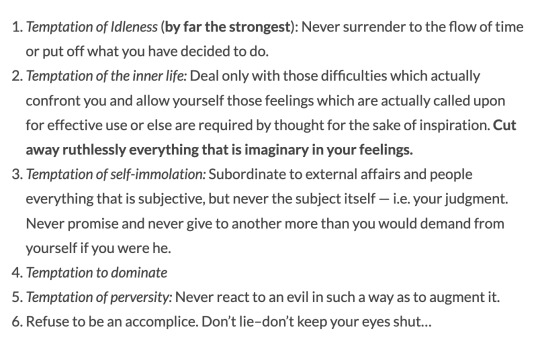
Simone Weil's 'The List of Temptations (to be read daily)' from her diary
99 notes
·
View notes
Text
“Languages are not algorithms of one another, you cannot match them item for item,” she says, adding “what if [there is] a word that does not intend to be translatable.” She calls this “a word that stops itself,” and writes: “in the presence of a word that stops itself, in that silence, one has the feeling that something has passed us and kept going, that some possibility has got free.” There it is again, that indescribable nearness, the sense of proximity to something words can’t identify.
— In which she is Anne Carson, as written here.
#anne carson#language#fragments#thinking about this as i despair over my thesis#(it's not just words but all of language)
8K notes
·
View notes
Text
About this time I had a dream which both frightened and encouraged me. It was night in some unknown place, and I was making slow and painful headway against a mighty wind. Dense fog was flying along everywhere. I had my hands cupped around a tiny light which threatened to go out at any moment. Everything depended on my keeping this little light alive. Suddenly I had the feeling that something was coming up behind me. I looked back, and saw a gigantic black figure following me. But at the same moment I was conscious, in spite of my terror, that I must keep my little light going through night and wind, regardless of all dangers. When I awoke I realized at once that the figure was...my own shadow on the swirling mists, brought into being by the little light I was carrying. I knew, too, that this little light was my consciousness, the only light I have. My own understanding is the sole treasure I possess, and the greatest. Though infinitely small and fragile in comparison with the powers of darkness, it is still a light, my only light.
C.G. Jung, Memories, Dreams, Reflections
246 notes
·
View notes
Text



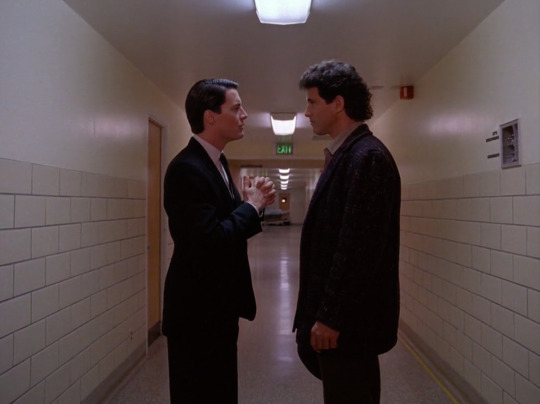





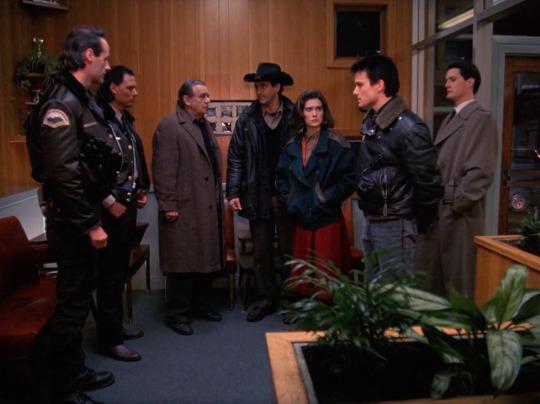
Twin Peaks, 1990, dir. David Lynch
SE01E01 Northwest Passage
75 notes
·
View notes
Text
Neither language nor mind abides by the requirement of closure, except perhaps temporarily, for limited tasks. Both mind and language are necessarily open systems that constantly expand, add meta-levels, learn and modify themselves. Equally, both language and mind are notoriously promiscuous in violating Russell's constraint on self-inclusion and reflexivity. Consciousness is indeed forever adjusting its frame, shifting meta-levels; it keeps re-framing and reflexively framing itself. This propensity of consciousness is neither an aberration nor an accident. Rather, it is a necessary, adaptively motivated capacity; it stands at the very core of our perceptual and cognitive processing mechanisms. It is a precondition for the mind's ability to select, evaluate, file, contextualize and respond appropriately to mountains of information.
Mind, Code and Context: Essays in Pragmatics, by Talmy Givón (1989)
#talmy givón#mind code and context: essays in pragmatics#linguistics#pragmatics#fragments#consciousness#self#reality
8 notes
·
View notes
Photo
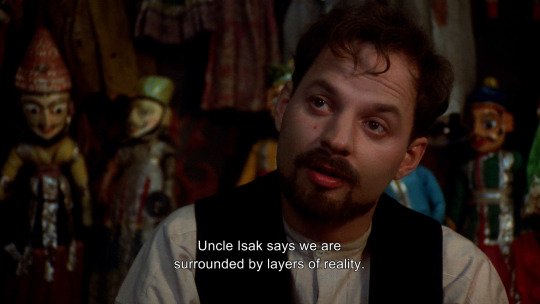

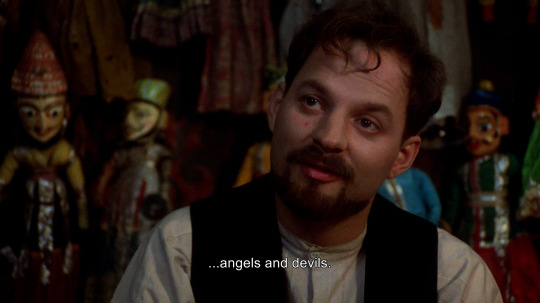
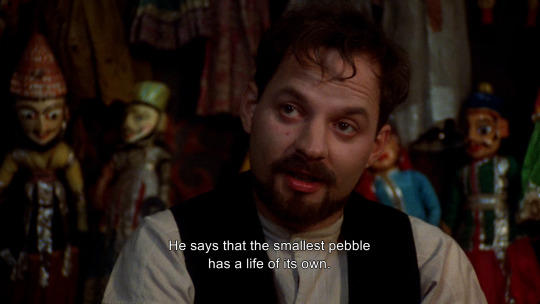


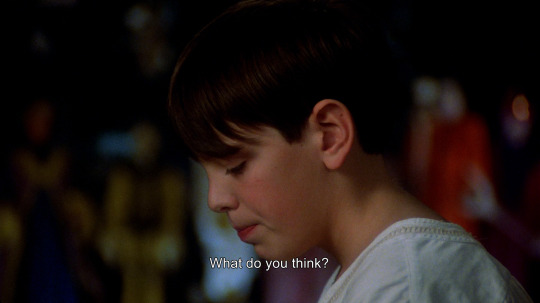

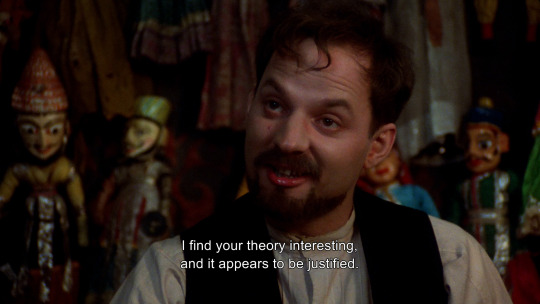
Fanny and Alexander (1982) | dir. Ingmar Bergman
117 notes
·
View notes
Photo

Sognsvann Lake, Oslo, Norway. Photo by Haarkon
3K notes
·
View notes
Text
The non-pragmatic tradition speaks of two modes of knowledge - or modes of inference - deductive and inductive. The first proceeds from the general rule to its specific instances. The second presumably proceeds from specific instances to the general rule. Pragmatically-based abductive inference -- concerning appropriateness of context, importance, relevance, similarity or explanation -- is in principle a different kind of reasoning. It proceeds by hypothesis, guesswork or intuition, often by analogy. It is thus, in principle, unconstrained.
Mind, Code and Context: Essays in Pragmatics, by Talmy Givón (1989)
#talmy givón#mind code and context: essays in pragmatics#fragments#reality#language#pragmatics#linguistics
4 notes
·
View notes
Text
The classical dictum also attributed to Heraclitus: "...you never step twice into the same river..." is also essentially pragmatic, presumably pointing out to the ever-changing context -- time, the river, the self.
Mind, Code and Context: Essays in Pragmatics, by Talmy Givón (1989)
#talmy givón#mind code and context: essays in pragmatics#linguistics#language#pragmatics#self#reality#transcendence
43 notes
·
View notes
Audio
Prefab Sprout - Andromeda Heights
(Andromeda Heights, 1997)
24 notes
·
View notes